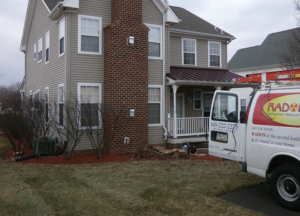Radon-Rid, LLC Explains Long-Term Testing vs. Short-Term Testing
 Pennsylvania has seen a larger than average amount of homes with elevated radon levels in recent years; both officials and the public are concerned. This uptick in radon levels is the reason testing has become a top priority: to keep the general public safe. Short-term radon testing is a way to find out if an immediate issue is present, and long-term testing is used to monitor levels over time. Both types of testing have value in Pennsylvania.
Pennsylvania has seen a larger than average amount of homes with elevated radon levels in recent years; both officials and the public are concerned. This uptick in radon levels is the reason testing has become a top priority: to keep the general public safe. Short-term radon testing is a way to find out if an immediate issue is present, and long-term testing is used to monitor levels over time. Both types of testing have value in Pennsylvania.
Radioactive gas exposure is dangerous. Radon is one such gas, and exposure to this gas is the number two cause of lung cancer in the United States. If you are concerned about radon gas in your home, you are in good company. Below we explain the difference between long and short-term radon testing.
Short-Term Radon Testing
Short-term radon testing has been the most used method for many years now and is expected in a lot of areas as part of a home inspection. Short-term tests can last from 2-90 days, with 2-4 being the most typical. These tests usually only measure the radon level for a short window of time, so additional testing may be recommended if a short term test shows levels higher than 4 pCi/L or higher.
Short-term testing can be accomplished using a kit from a hardware store, or you can find a certified professional who can follow up with radon remediation if necessary. A canister is placed in the lowest area used for living space in the home. After the determined time has passed, the canister is sent for evaluation.
Long-Term Radon Testing
One of the main reasons for using more than just short-term testing is that radon levels can fluctuate, based on weather, whether the home has been closed up, and other factors. A short term test will usually indicate if the home should be considered for remediation, but a long term test considers the radon levels over time. If your home was to experience a spike in radon during the testing period, you might seek remediation even when such action may be unnecessary.
Long term tests measure radon levels over a period of more than 90 days. Some of them, using active equipment connected to a power source, can even sense when doors have been opened frequently, and you can tell if a spike has occurred during the same time that a high pressure weather front has been present.
Short-Term Radon Testing Needs Long Term Solutions
If you are concerned about radon levels in your home and the health your family contact a reliable and reputable radon specialist. Radon-Rid, LLC offers both long and short-term radon testing and if needed, will determine which radon remediation system will be most effective in your home. Contact us today for more information or to schedule a consultation.
Related Posts
Why Are More People Testing for Radon in 2020?
Why Should I Hire a Professional Radon Testing and Remediation Company?
Is Radon Testing Necessary When Buying A Home?
We Want to Help
"(required)" indicates required fields
Categories
- Blog (48)
- Environmental Pollution (2)
- Family Health (9)
- In the News (10)
- Lung Cancer (5)
- Radon Remediation (10)
- Radon Testing (24)
Radon – The Silent Killer
Radon In Your Home
- Learn More About Radon Levels in Your County
- Take a few minutes to browse our Get To Know Radon Online Presentation.
- When you are finished, be sure to tell a loved one about our testing programs offered in Berks, Chester, Delaware, Lancaster, Montgomery & Philadelphia Counties.